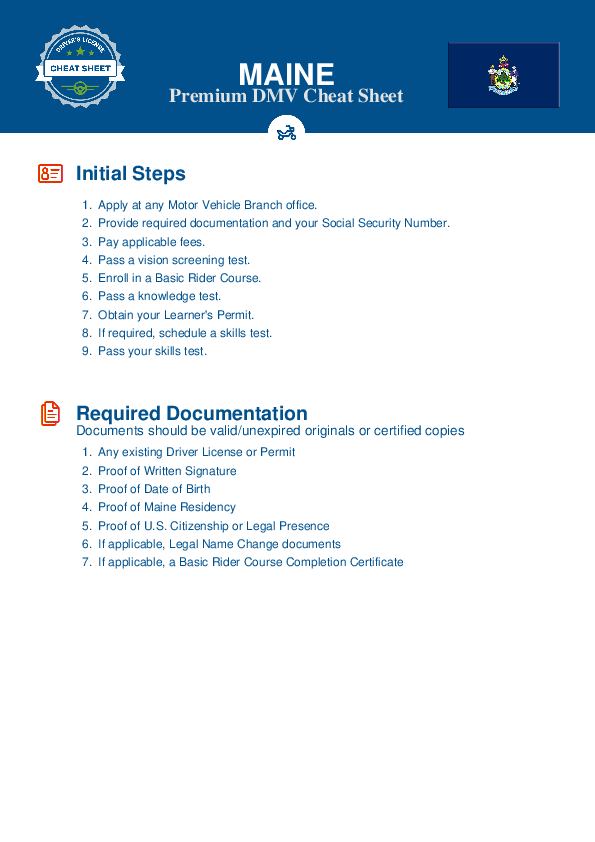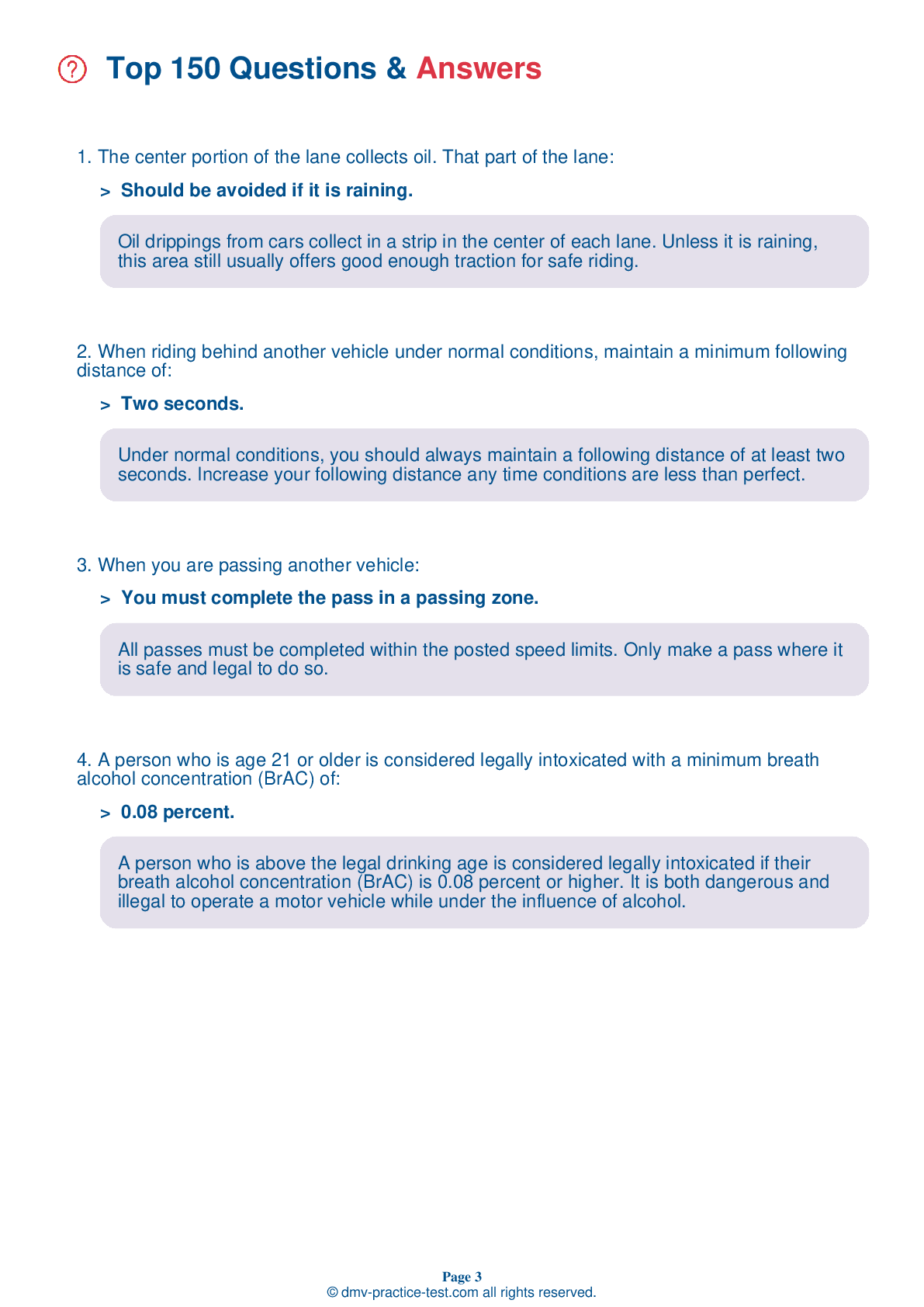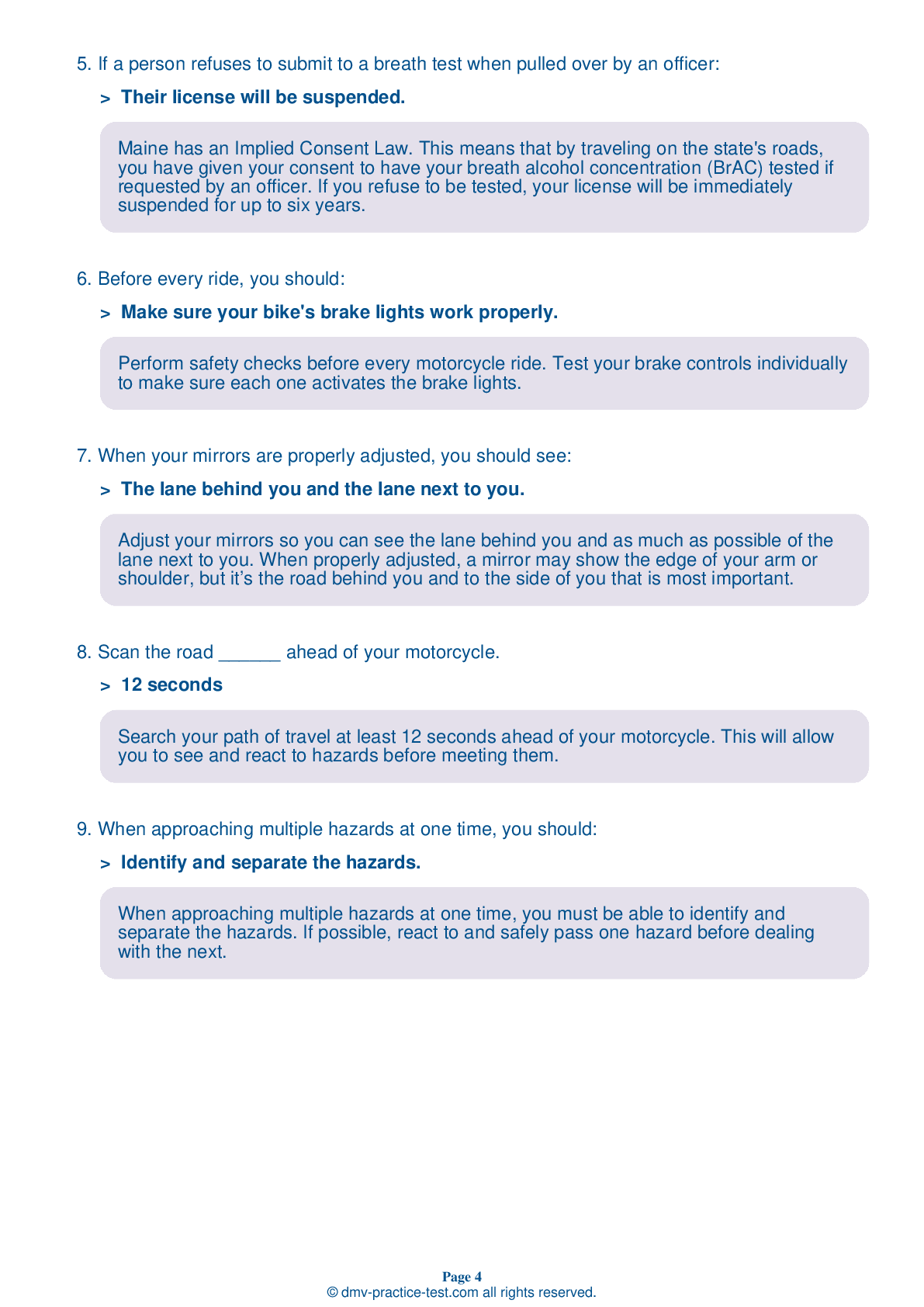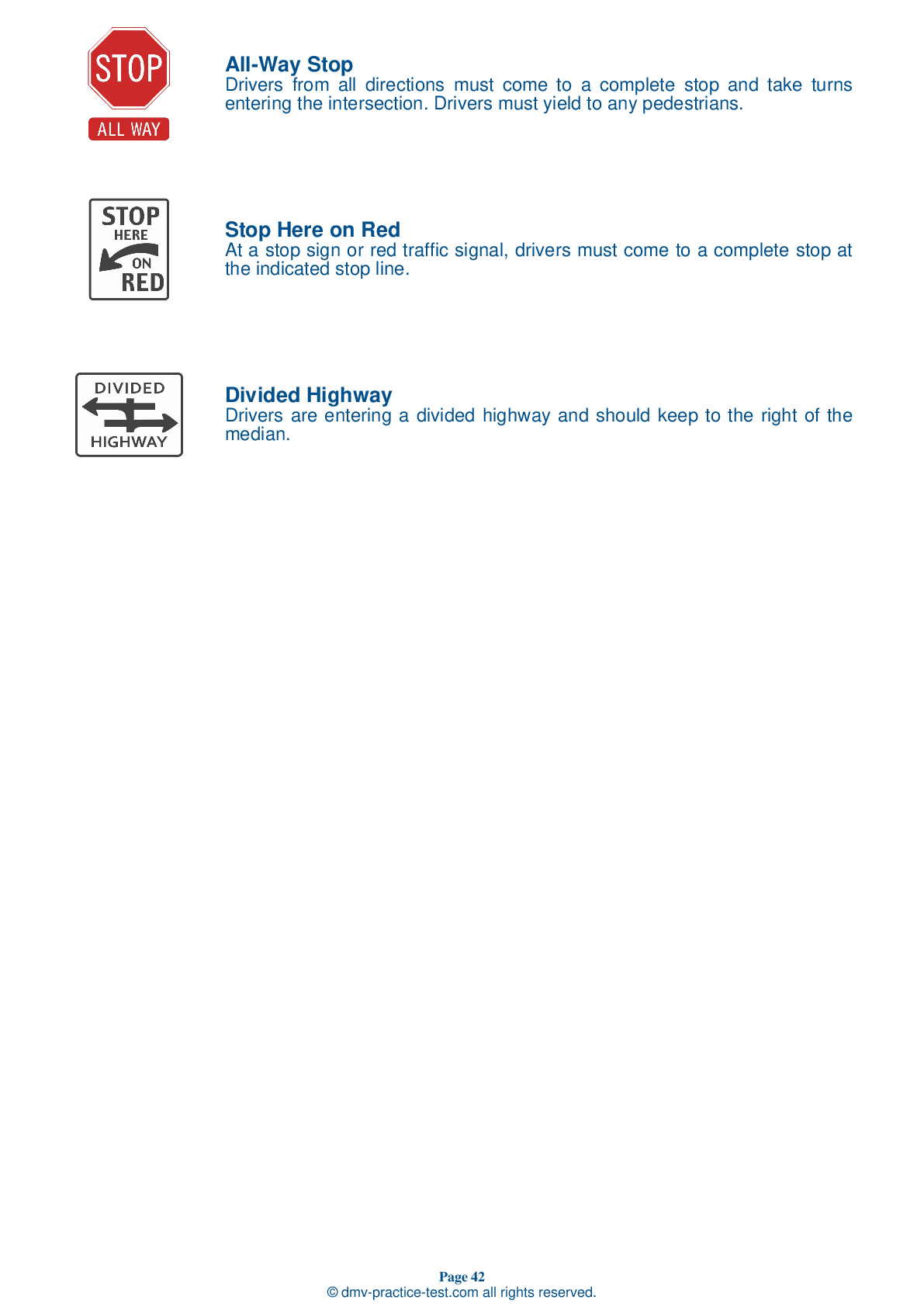DMV Permit Test #1
Motorcycle Test | License ME 2026 | FREE Online Practice! #1 Page 6 of 7
Take this FREE motorcycle test (license in ME 2026) to check your knowledge of the road rules. To improve your results, download a motorcycle handbook online, study theory, and practice for free on our website. Still worried about how to get a motorcycle license in Maine in 2026? Check our website for more sample tests, train as much as possible, and boost your grades!
50
40
16
36 . Which of the following is not a good way for a rider to increase their visibility?
Waving at other drivers
To make yourself visible to other road users, you should wear brightly-colored clothing with reflective materials, use your headlight at all times, and use your signals and brake light properly.
37 . Hearing protection is:
Not a concern for those with good hearing.
Even if you wear a helmet, exposure to wind and engine noise can damage your hearing. Wearing earplugs or other hearing protection can guard against damage while still allowing you to hear important sounds, such as car horns or emergency sirens.
38 . If you are riding in traffic when a small animal enters your lane, you should:
Flash your lights to try to scare the animal.
Do everything you safely can to avoid hitting an animal in the road. If you are in traffic, however, you should remain in your lane. Swerving into another lane of traffic to avoid hitting an animal can cause you to collide with another driver. Hitting something small is less dangerous than hitting something big.
39 . When approaching a blind intersection, riders should:
Stop at the stop line then proceed through the intersection.
When approaching a blind intersection that is controlled by a stop line or stop sign, you must first stop where indicated. You may then edge forward and stop again just short of where the cross traffic lane meets your lane. From that position, lean your body forward and look around buildings, parked cars, or bushes to see if anything is approaching. Make sure your front wheel stays out of the crossroad while you are looking.
40 . A person who is age 21 or older is considered legally intoxicated with a minimum breath alcohol concentration (BrAC) of:
0.08 percent.
A person who is above the legal drinking age is considered legally intoxicated if their breath alcohol concentration (BrAC) is 0.08 percent or higher. It is both dangerous and illegal to operate a motor vehicle while under the influence of alcohol.
41 . The front brake:
Should be the only brake you use.
The front brake is much more powerful than the rear one and provides at least 70 percent of a motorcycle's total stopping power. Use both brakes every time you slow or stop.
42 . When changing lanes, riders should:
Slam on the brakes to allow any vehicles in their blind spot to pass.
A motorcycle has blind spots just like any other vehicle. A rider must always turn their head to check for traffic before changing lanes.
Need Motorcycle Insurance? No problem!
Compare the best rates in Maine and find a personalized policy that meets your needs.
1. Are You Currently insured ?
2. Married ?
3. Do you own your Home?
4. Have you or a Family Member Honorably Served in U.S. Military ?
5. Your Name
6. Age
7. Zip code
Ranked by best match
2026 Maine | Frequently Asked Questions
To acquire a motorcycle driver's license in Maine, you must first obtain a motorcycle learner's permit. This involves passing a written test. After practicing with the permit for at least 60 days, you can take the road test to get your motorcycle license. You must also complete an approved motorcycle rider education course.
In Maine, the minimum age for obtaining a motorcycle permit is 16 years old. This permit allows for supervised practice. To receive a motorcycle endorsement or license, the applicant must pass a written test and a road test. However, if the applicant is under 18, they must also complete an approved motorcycle rider education course.
Yes, you do need a dedicated license for motorcycle riding in Maine. A motorcycle endorsement can be added to your regular driver's license after passing a written exam and a road test. Alternatively, you can obtain a separate motorcycle-only license. Both require successful completion of an approved motorcycle rider education course or passing the state tests.
To apply for a motorcycle driver's license in Maine, you'll need: proof of identity (like a birth certificate or passport), proof of Maine residency, your Social Security number, and if applicable, legal presence documents. If under 18, parental consent and proof of driver education completion are required. A vision test and written exam must be passed, and fees paid.
Yes, to get a motorcycle license in Maine, you will need to take a written exam. This test assesses your knowledge of motorcycle operation, traffic rules, and safety practices. If you successfully complete an approved motorcycle rider education course, it may help waive the road test but not the written exam.
The motorcycle written test in Maine covers topics related to safe motorcycle operation. It includes subjects like traffic rules and regulations, road signs, motorcycle handling, braking, turning, carrying passengers or cargo, dealing with emergencies, and riding under challenging conditions like bad weather or heavy traffic. The test is designed to ensure you understand the basics of safe motorcycling.
No, you cannot substitute the written test with a motorcycle training course in Maine. The course can help prepare you for the test, but the written exam is a separate requirement for your motorcycle license. However, successful completion of a training course may waive the road test requirement. Always check with Maine's Bureau of Motor Vehicles for specific rules.
To enroll in a motorcycle training course in Maine, you need to contact an approved motorcycle rider education provider. You can find a list on the Maine Bureau of Motor Vehicles website. Once you choose a provider, contact them directly to register. The courses usually involve classroom instruction and hands-on training. Completion of the course may help waive the road test requirement for licensing.
No, you don't have to own a motorcycle to take the license test in Maine. You can use any motorcycle as long as it's registered, insured, and passes a basic safety inspection. However, you must be comfortable and familiar with the motorcycle you're using for the test.
Yes, you can use a friend's motorcycle for the driver's license evaluation in Maine. However, the motorcycle must be legally registered, insured, and meet all safety standards. Also, you should feel comfortable and confident riding it as you will be evaluated on your ability to safely operate it.
Yes, during the Maine motorcycle driving exam, several specific handling skills are tested. These include your ability to start and stop, turn and swerve, accelerate and decelerate smoothly, and properly use your mirrors and signals. You'll also be evaluated on your overall control of the motorcycle, including balance and posture.
Yes, new motorcycle drivers in Maine are given a provisional license for one year. During this period, they are not allowed to carry passengers, and they cannot drive between sunset and sunrise. Violation of these restrictions can lead to a suspension of the provisional license.
Yes, your Maine motorcycle license or a driver's license with a motorcycle endorsement allows you to operate a motorcycle in any other state in the U.S. However, you should be aware of and comply with each state's specific rules and regulations regarding motorcycle operation.
In Maine, motorcycle operators and passengers under 18 years of age are required to wear a helmet. While it's not mandatory for those 18 and older, wearing a helmet is highly recommended for safety reasons. The helmet must meet the standards established by the U.S. Department of Transportation.
Maine offers a Class M motorcycle license for operating motorcycles and motor-driven cycles. There isn't a variety of motorcycle licenses, but you can add a motorcycle endorsement to your existing Maine driver's license. This requires passing a written test and a road test. Contact your local BMV office for further information.
Yes, in Maine, you can add supplementary endorsements to your motorcycle license. These endorsements allow you to operate additional types of vehicles. For instance, a '3' endorsement allows operation of three-wheel motorcycles. Each endorsement requires passing a specific written and skills test. Check with the Bureau of Motor Vehicles for further details.
Yes, in Maine, the Bureau of Motor Vehicles (BMV) provides the motorcycle license test in several languages other than English. However, it's recommended to contact your local BMV office directly to confirm the availability of your preferred language before scheduling your test.
To prepare for the motorcycle license test, start by studying the Maine Motorcycle Operator Manual thoroughly. It covers all the information you'll need. Then, take several practice tests to familiarize yourself with the format and types of questions asked. Also, consider enrolling in a motorcycle safety course for hands-on training and additional test prep.
Yes, the motorcycle written exam in Maine can be taken in several languages other than English. However, it is advisable to contact your local Bureau of Motor Vehicles (BMV) branch beforehand to confirm the available languages and set up the necessary arrangements.
Yes, if you don't pass the motorcycle written test in Maine, you are allowed to retake it. However, you must wait a minimum of one day before retaking the test. It's important to study thoroughly to ensure you understand all the rules and regulations for operating a motorcycle safely.



